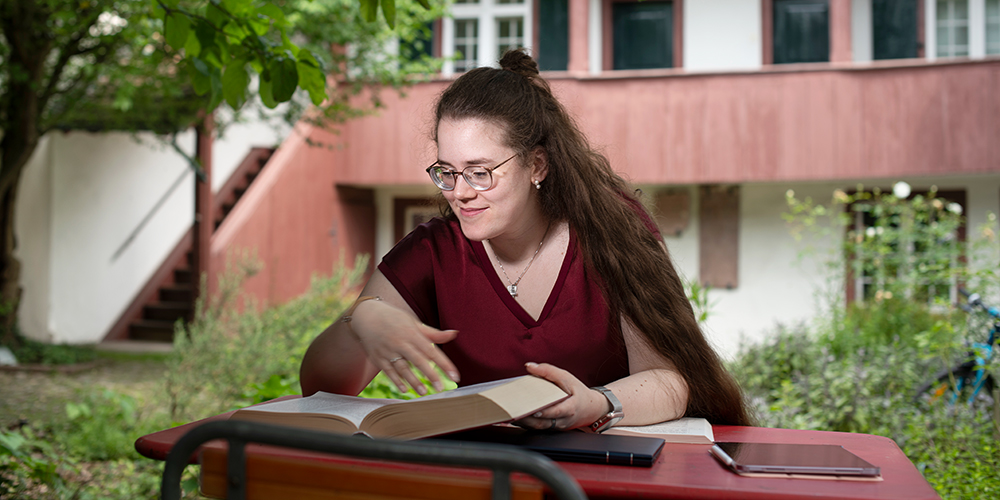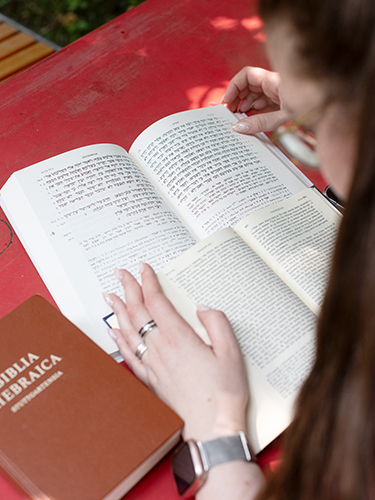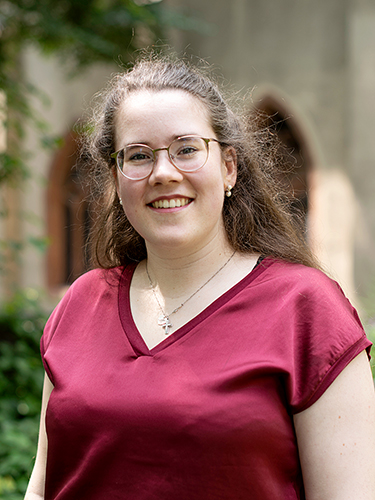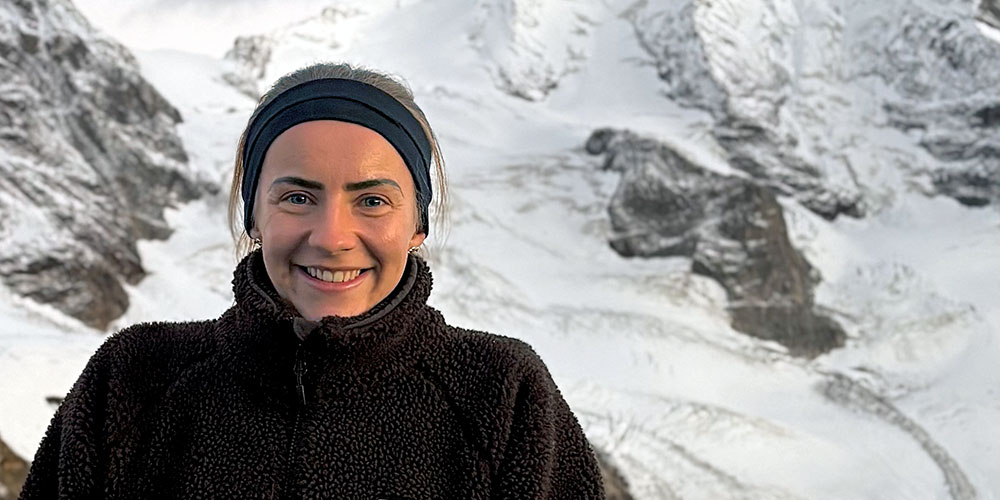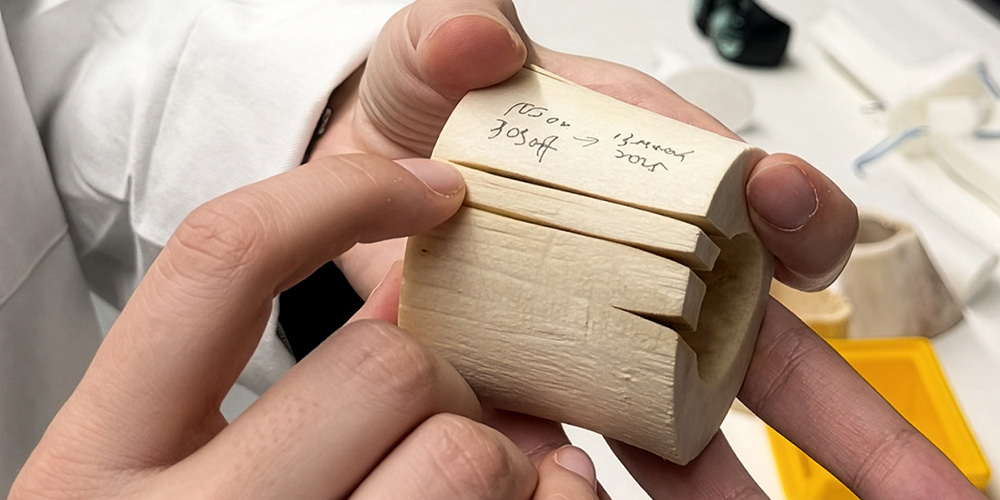In Focus: Anita Dirnberger wants to understand what motivates people
Her interest in history and other people led her to study theology; it also plays a role in her dissertation. Anita Dirnberger focuses on a passage from the Hebrew Bible that challenges her time and again. She balances her everyday life in research and teaching by working with her hands.
10 July 2025 | Noëmi Kern
Become a pastor. Anita Dirnberger aspired to this career back when she was a secondary school student. At that time, she and her classmates had to grapple with the question of what they should do at the end of their compulsory education. This is why she took the entrance examination for high school with a view to studying theology later. “I needed this vision to know what I was working toward. That kept me going through high school, especially when I didn’t find it all that fun at times,” she says, looking back. “Even today, it’s important to me to have a goal in mind that I’m working toward.”
Anita Dirnberger grew up in Andeer in the canton of Graubünden. It is not primarily faith or religion that motivated her to study theology. She wouldn’t call herself particularly pious. What appeals to her about the idea of being a pastor is meeting other people and supporting them.
Insight into other worlds
Studying at the University of Basel’s Faculty of Theology proved to be the right decision. The friendly atmosphere at the small faculty appeals to her. “We all know each other. We form study groups, share experiences and support each other through dissertations.”
In terms of content, Dirnberger is fascinated by the meeting of different disciplines. Working methods from the humanities and social sciences come together, while philosophy, literature and history are combined in one degree program. And in order to work on the biblical texts, she needs to know Ancient Greek and Biblical Hebrew. For her, languages are “like opening a door into another world.” The 27-year-old tells her story over a coffee in the idyllic garden of the Frey-Grynaeische Institute.
Her enthusiasm for her subject is clearly palpable. At the same time, she is very reflective. It is important to her to examine the biblical texts critically and to read them within the context of the time in which they were written. They are not simply beautiful stories written to entertain or teach. “Violence is always a big topic. That’s not very edifying.”
Respect for others
Her dissertation focuses on Zechariah 9–14, also known as Second Zechariah. This part of the Hebrew Bible deals with ideas for the restoration and organization of the community in Judea during a time of war and insecurity and how these ideas changed. The text was written rather late and was added to the Book of Zechariah. “You have to ask yourself why this is the case. After all, another separate book could have been integrated into the collection of the Twelve Minor Prophets.”
Even if she does not have a definite answer to this question, Anita Dirnberger’s aim in her work with biblical texts is to understand the context in which they originated. What did the people who wrote them want to communicate? What was important to them? “This is the only way we have a chance to understand what their content means,” she emphasizes. It is about taking people seriously in their time and their reality. At this particular moment, she relates this to the historical texts, but conversations with her show that she also follows this principle in the way she interacts with her fellow human beings.
“I find it fascinating that these texts have been handed down for such a long time that we can still read them today.” This shows that they were considered important. And although they are over 2,000 years old and seemingly far removed from our reality, we can still learn something from them today. She firmly believes this. “Just because they don’t necessarily mean anything to us doesn’t mean that other people aren’t moved by them.”
The university as an exciting universe
In addition to her research, Anita Dirnberger works as an assistant to her PhD supervisor, Sonja Ammann, and has a teaching assignment. Having these different roles at a small faculty is good training for life. “That’s just as important to me as completing a dissertation,” she says emphatically.
The work and the dialog with students is great fun, while also being challenging at the same time. “I give a lot of myself. When working with other people, you need to be your authentic self,” she says.
For this to work in the long term, she had to learn to be “completely present, but also completely removed.” “You could always do more, and there’s always a risk that you will take your work home with you.” The fact that she commutes between Basel and her home in Illnau in the canton of Zurich helps her to distance herself. Anita Dirnberger finds balance with cross-stitch embroidery, an activity that offers a contrast to her everyday life in many ways. Here, she sees the immediate result of her actions, she works with her hands, and in contrast to the black-and-white letters in the scriptures she studies, the yarn offers all the colors of the rainbow. “What’s more, I don’t have to think about much when I do embroidery, while I’m always grappling with new questions at university.”
Options for the future
There will also be a change in the coming fall semester, when Anita Dirnberger will be released from her teaching commitments so that she can devote herself fully to her dissertation. She would like to spend part of her time at Harvard with her former colleague, who is a professor there. Preparations are currently underway. “I remain confident that it will work,” she says.
And when will Anita Dirnberger stand before a congregation as a pastor for the first time? She laughs. “I don’t know yet.” At the moment, she finds her various tasks at the Faculty of Theology so exciting and enriching that continuing to work at the university is also an option. As important as the prospect of her dream job as a pastor was, at the moment she values the openness and the opportunity to pursue different paths. In any case, this spring she completed her practical training in a hospital to serve as a chaplain.
In Focus: the University of Basel summer series
The In Focus series showcases young researchers who are playing an important role in furthering the university’s international reputation. Over the coming weeks, we will profile academics from different fields – a small representative sample of the 3,000+ doctoral students and postdocs at the University of Basel.

